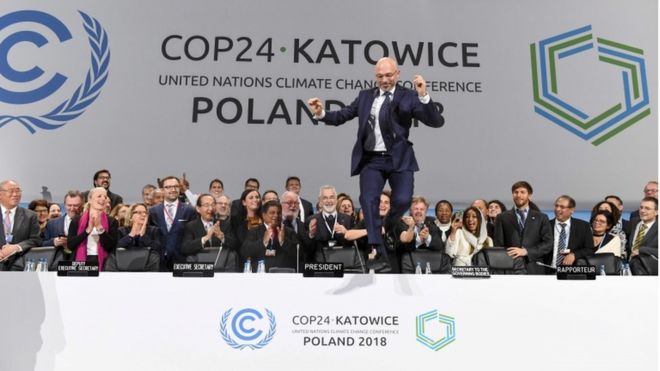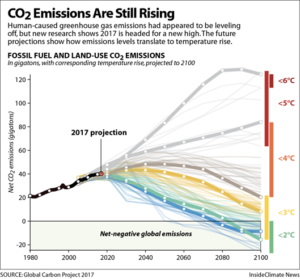Is there hope for a green future?
December 18, 2018 | Expert Insights

The recent international climate change negotiators at the Climate Summit in Poland announced that they have reached an agreement. The future path forward for countries is to reduce greenhouse gases and establish stronger transparency rules for countries to disclose their emissions.
Background
COP24 is the informal name for the 24th Conference of the Parties to the United Nations Framework Convention on Climate Change (UNFCCC). The UNFCCC is a Rio Convention, one of three adopted at the Rio Earth Summit in 1992. The UNFCCC entered into force on 21 March 1994. Today, it has near-universal membership. The countries that have ratified the Convention are called Parties to the Convention. Preventing dangerous human interference with the climate system is the ultimate aim of the UNFCCC.
The Conference of the Parties (COP) is the supreme body of the UNFCCC Convention. It consists of the representatives of the Parties to the Convention. It holds its sessions every year. The COP takes decisions which are necessary to ensure the effective implementation of the provisions of the Convention and regularly reviews the implementation of these provisions. Following a decision of the 22nd Session of the Conference of the Parties to the Climate Convention (COP22) in Marrakesh in November 2016, the successive climate summit was to be held in Poland. Poland was selected to host this event within the framework of the Eastern European Group (EEG).
Poland held the Presidency of the Climate Convention for the third time. COP24 took place from 2-14 December 2018, in Katowice, Poland.

Analysis
After two weeks of intense negotiations, the annual COP24 UN climate conference concluded by agreeing on two key aspects. The first was a consensus to cut greenhouse gas emissions and the second was to establish stronger transparency rules for countries to disclose their emissions.
The world has become warmer by about 1C since the industrial revolution. Former president of the Maldives and their lead negotiator, Mohamed Nasheed, made an impassioned plea for urgent progress on cutting carbon. However, the final outcome included hints at the need for more ambitious climate pledges before 2020.
The key takeaways from the summit are as follows:
1. COP24 gathered diplomats from around the world to concluded by agreeing to the “rulebook” for the Paris Agreement on climate change. Climate commissioner Miguel Arias Canete explained: "We have a system of transparency, we have a system of reporting, we have rules to measure our emissions, we have a system to measure the impacts of our policies compared to what science recommends."
2. Due to a significant rise in nationalism in many countries, for instance in Brazil, with the recent election of Jair Bolsonaro as the President, has led to a rise in fear that issue of climate change would not be a matter of consideration. However, the summit centred around establishing international cooperation and for showing international spirit towards tackling climate change.
3. One of the main highlights of this year’s conference is the large participation of energised young people. The most memorable image of this meeting was that of 15-year-old Swedish student Greta Thunberg. The teenager has organised school strikes in Sweden and held daily press conferences at the summit with a clear message that warm words aren't enough any more. “We cannot solve a crisis without treating it as a crisis."
4. One of the key drawbacks of the summit was that a key scientific report from the Intergovernmental Panel on Climate Change (IPCC) was not welcomed by Saudi Arabia, the US, Kuwait and Russia. The report said that the world is now entirely off track, heading more towards 3C this century rather than 1.5C. If warming were to be kept to 1.5C this century, then emissions of carbon dioxide would have to be reduced by 45% by 2030.
5. This year’s conference was held in Katowice, which is the heart of Poland’s coal country. The very coal companies also sponsored the conference. About 80% of the electricity comes from coal which is a significant greenhouse gas emitter.
Counterpoint
Though countries have agreed on following the rulebook, poorer nations want some "flexibility" in the rules as they should not be subject to regulations that would be difficult to adhere. Ironically, 2018 has recorded the highest greenhouse gas emissions and this is expected to accelerate further.
Assessment
Our assessment is that the need of the hour is to abide by the rule book and implement clear policies to tackle climate devastation. We feel that nations must demonstrate deep commitment in addressing the severity of climate change. We understand that balancing a nation’s economic objectives and cutting greenhouse gas emissions is a challenging task. While this is so, the core objective of any nation must be sustainable development and to ensure that natural resources are not totally depleted but are available for future generations.
Read more:








Comments